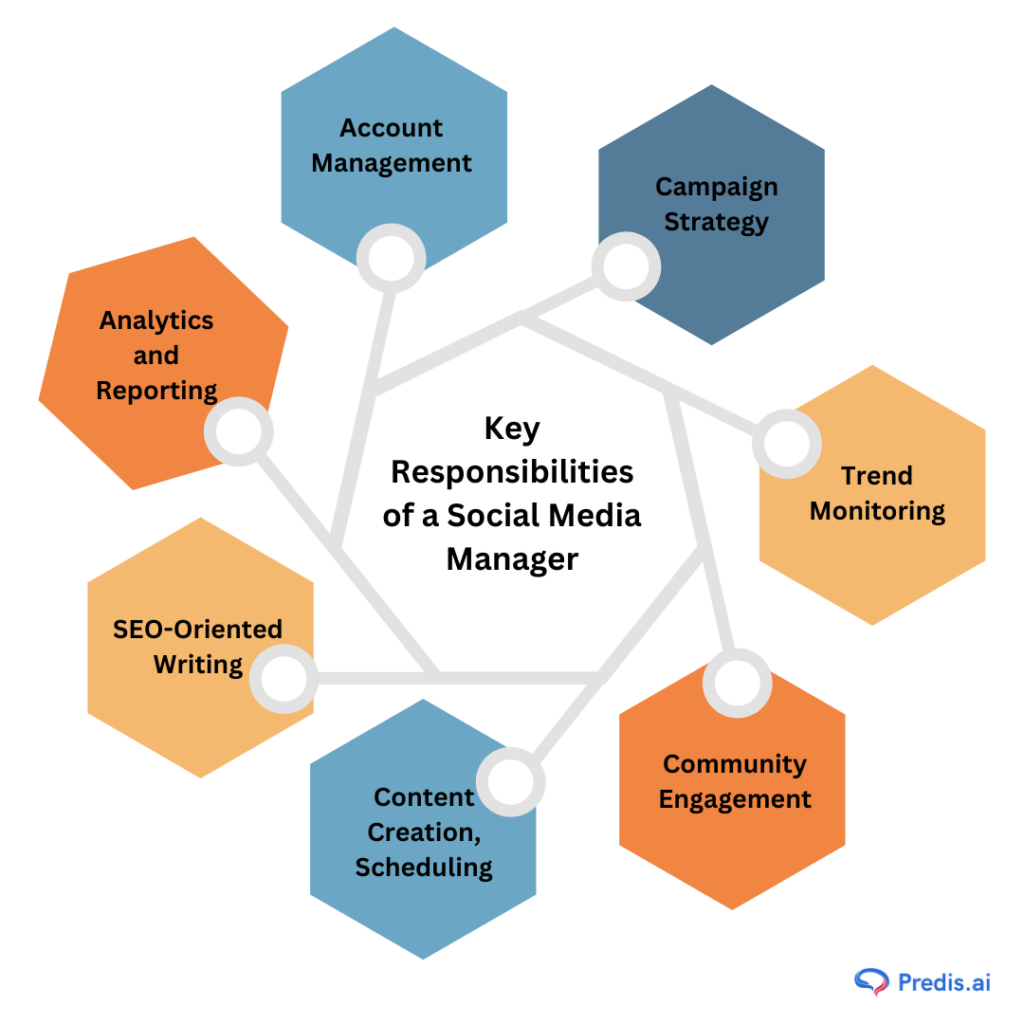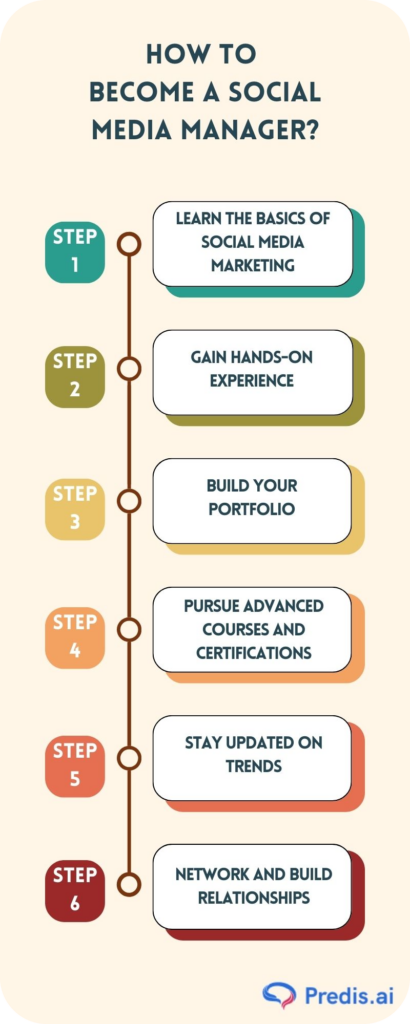Are you passionate about social media platforms like Facebook, Instagram, and Twitter? These platforms are no longer just for connecting people but they’ve become powerful tools for marketing and communication as well. Nowadays, businesses have also started to rely on them in order to build brands, engage audiences, and drive sales. If you dream of thriving in this fast-paced industry, this blog is your roadmap. This blog will help you learn what it takes to be a great social media manager if you want to work in this field. Let’s dive in and explore the steps and skills you need, to launch an exciting career in social media management!
What is a Social Media Manager?
A social media manager is in charge of supervising and implementing a brand’s social media presence. They operate as the company’s voice, ensuring that the message and interaction are consistent across all social media platforms.

7 Key Responsibilities of a Social Media Manager
- Account Management: The first and foremost responsibility is managing the account, by managing various social media platforms, such as Instagram, Facebook, Twitter, and LinkedIn.
- Content Creation and Scheduling: A social media manager should know how to design and post engaging multimedia content such as videos,reels and image posts, specifically tailored for the target audience.
- Analytics and Reporting: Media managers should be well acquainted with monitoring performance measures such as impressions, reach, and conversions for better reporting and analysis.
- Community Engagement: Responding to comments, messages, and mentions to strengthen online relationships and engagement with the audiences.
- Campaign Strategy: Developing and executing social media campaigns in order to meet marketing objectives.
- Trend Monitoring: Staying updated on social media trends, algorithm changes, and best practices.
- SEO-oriented writing: SEO (Search Engine Optimization) has become an integral part of content marketing and social media. A qualified Social Media Manager understands the value of incorporating SEO to improve social media content and increase visibility. By including SEO in your approach, you can reach a larger audience and increase your prospective customers.
A Guide to Social Media Management for Beginners
Why You Should Become a Social Media Manager?
As businesses move their focus online, the need for people who know how to use social media is growing. Here are some reasons why it seems like a good job:
- High Demand: Every business needs to have a strong online footprint, which means that social media management profiles are always open for work.
- Creative Freedom: Social media allows you to experiment with content and advertising.
- Remote Opportunities: Flexible work from home and freelancing options.
- Career Growth: Working as a social media manager can lead to starting your own social media marketing company.
- Diverse Roles: From creating content and doing analytics to designing strategies and managing clients, the area includes careers for those with a variety of hobbies and skills.
To find a job easily, many professionals use tools like a resume maker to quickly create standout resumes tailored to social media roles.
How to Become a Social Media Manager? Top Skills You Must Have
- Creativity: Create visually beautiful, interesting, and relevant content.
- Analytics Proficiency: Use Google Analytics and platform insights to monitor progress.
- Writing Skills: Use your writing abilities to create engaging captions, blogs, and plays.
- Organization: Manage various accounts, timelines, and projects with ease.
- Customer Engagement: Connect with your followers to understand more about them.
- Trend Awareness: Keep a track of all new social media features and system changes to keep yourself updated with the current trends.
- Technical Skills: Use Predis.ai, Figma, Adobe Spark, and other tools to accelerate production. Complementing this hands-on experience with IT technical training can further enhance your understanding of digital tools and platforms.
To stand out to employers, it’s very important not only to build these abilities but also to know how to present your skills for resume properly when applying for social media roles.
6 Steps to Become a Social Media Manager

1: Learn the Basics of Social Media Marketing
- You can learn the basics of social media sites and how they can be used for business to get started by taking a course on how to manage social media. You can also look into free tools like Google Digital Garage-Skillshop and HubSpot Academy.
- Learning how to use platform-specific strategies well, such as how to sell on Instagram or get leads on LinkedIn, will help a lot in social media marketing.
- In order to feel more comfortable in industry relevant keywords, learn terms like “engagement rates,” “impressions,” and “click-through rates.”
2: Get Real World Experience
- There’s no substitute for real-life knowledge. Help small businesses or non-profits with their finances by taking on volunteer work. Work as an intern at a social media marketing firm to learn from professionals and get inside information on the field.
- To improve your skills, take part in online tasks like making a 30-day content calendar.
- Join social media groups to meet new people and share what you know with your peers and teachers.
3: Build Your Portfolio
- Make a resume to show off your skills using an AI resume maker. Showcase efforts that worked, engagement metrics, and new ways of doing things. You can get full-time jobs or work as a freelance social media manager if you have a good portfolio.
- Include case studies that explain your work’s approach, how it was carried out, and what the results were.
- To make your portfolio look better, use layouts that look good and pictures of successful posts or campaign dashboards.
- You could also create a digital business card with Uniqode’s Digital Business Card to share your portfolio, contact info, and social links in one place.
4: Pursue Advanced Courses
- Sign up for specialized classes or get certifications to take your skills to the next level. Enrolling in a Digital marketing course provides advanced strategy and analytics training beyond basic platform skills. Some popular choices are:
- Google’s Social Media Certification is a free study that teaches you how to use social networks properly.
- Hootsuite Academy offers more advanced training on how to run programs and track how well they’re doing.
- Facebook Blueprint is perfect for people who are focused on paid advertising.
5: Network and Build Relationships
- Connect with other social media professionals on platforms such as LinkedIn or at networking events.
- Participate in relevant online groups and contribute your views to establish yourself as an informed professional.
- Networking with the right people result in mentorships, collaborations, and career prospects.
6: Stay Updated on Trends
- As social media is constantly changing, so staying informed becomes an important part. Follow industry blogs, attend webinars.
- Keep up with the algorithm updates and emerging trends like AI tools, social commerce, and interactive content.
Platform-Specific Social Media Management Strategies
The features and audience preferences of each social media platform vary. Here are some tips that work well on major platforms:
- Instagram: It is important to check that the quality of your Instagram Stories, Reels, and pictures is satisfactory. Utilize terms and hashtags that are widely used and interact with the people that follow you.
- Facebook: Make use of the Events and Groups feature on Facebook to bring people together. Advertisement efforts should be targeted to reach people in both the local and global markets.
- Twitter: Participate in conversations and make use of trending hashtags. Keeping followers interested requires that you schedule tweets.
- LinkedIn: The social networking site LinkedIn gives you the opportunity to join professional groups and submit content that demonstrates your competence as a thought leader. Ensure that your photograph is more notable.
- TikTok: Utilize TikTok to create engaging videos that are brief. Take use of sounds that are noticeable and work together with individuals who have a major impact.

Networking and Collaboration Opportunities for Social Media Managers
A number of different approaches can be utilized in order for social media administrators to network with one another and collaborate with one another. The establishment of a professional network is the initial step in the process of becoming an expert in the management of social media websites. What do you think would be the most efficient approach? Below are some opportunities that you can leverage in your favor:
- Participate in events such as business conferences and webinars. Using platforms like TravelPerk for business travel makes it easier to manage trips efficiently, giving you more opportunities to meet other professionals and expand your professional network.
- Through social media platforms such as Facebook and LinkedIn, you have the opportunity to become a member of online clubs and groups.
- Partner with other professionals, such as content creators or graphic designers, to enhance your services.
- It is strongly suggested that you seek the assistance of social media managers who have relevant experience in order to grow in your career.

Social Media Marketing: Emerging Trends
You can stay ahead by focusing on the following trends:
- AI Integration: Tools like ChatGPT are revolutionizing content creation and engagement, social media managers should be well versed in prompts required for ChatGPT. Being well-versed in how AI can enhance your strategy through AI integration solutions will set you apart in this competitive field.
- Micro-Influencer Marketing: Collaborating with niche influencers yields authentic connections and builds trust and loyalty.Social media managers should focus on building relationships with these niche influencers to drive meaningful engagement and create a more personalized connection with potential customers.
- Interactive Content: Media managers should use polls, quizzes, and Augmented Reality (AR) filters to keep the users/audience engaged. These types of content not only capture attention but also provide valuable insights into customer preferences and behaviors. You can significantly boost engagement and build stronger relationships with your followers by incorporating interactive elements into your social media strategy.
- Social Commerce: Social media is no longer just about engagement but it’s about transactions too. Platforms like Instagram Shopping, WhatsApp e-Commerce, and Facebook Shops are transforming the e-commerce landscape. Social media managers should tap into these features to create seamless shopping experiences for their audience and drive sales directly from social platforms.
Common Challenges Faced by Social Media Managers
1. Algorithm Updates
Platforms frequently update algorithms that affect organic reach. Stay proactive by engaging in industry webinars or reading updates from trusted sources. Create backup strategies, such as paid promotions, to prevent drops due to organic visibility. Create an email list to maintain direct communication with your audience.
2. Content Fatigue
Creating fresh and engaging content consistently can be challenging. Develop a library of evergreen content and repurpose it creatively. Use templates for recurring campaigns to save time. You can also experiment with user-generated content to diversify your posts and also keep your audience engaged.
3. Negative Feedback
Handling negative feedback requires calm, quick thinking, and a structured approach. This approach not only resolves the issue but also builds trust and strengthens your brand’s reputation. First, respond diplomatically—stay calm and respectful, avoiding defensiveness. Use predefined escalation matrices to ensure sensitive issues are addressed efficiently by the right person.Implement sentiment analysis tools to monitor audience reactions and identify potential issues early. Respond promptly to negative comments, showing that you value customer input. You need to be authentic in your replies—offer meaningful solutions and show genuine care.
4. Time Management
You need to have exceptional organizational skills to balance multiple accounts and deadlines. By implementing project management tools like Trello, Agency Simplifier, Monday.com or Notion, you can streamline tasks. Use a daily and weekly planner to break down tasks into manageable chunks. You can automate tasks that are repetitive, like auto-publishing Facebook posts or generating reports, etc.
5. Staying Updated
Constant learning is essential for rapidly evolving trends. One great way to stay competitive is by earning a Google Ads certification, which keeps your skills aligned with modern paid ad strategies.
Dedicating time weekly to explore trending hashtags, AI tools used by managers, or techniques relevant to your niche is a great way to stay updated.
Follow thought leaders and participate in relevant forums. Set Google Alerts for topics like “social media algorithm changes.”
Social media manager must-know tools
To succeed in SMM marketing, you need to learn the below tools:
- Predis AI: an AI-powered social media management platform that creates outstanding content/posts/videos instantly. Predis AI automates social media posts centrally. Performs competitive analysis to gain insights into your competitors’ strategies and activities.
- Hootsuite or Buffer: Schedule and track platform engagement. Advanced features like bulk scheduling can boost efficiency.
- Canva or Adobe Spark: Make stunning graphics and videos. Use templates for brand consistency.
- Google Analytics: Tracks website traffic and campaign success. You may create bespoke reports for actionable insights.
- Trello or Asana: Streamlines social networking and project management. Campaign progress can be tracked with Kanban boards.
Additional Social Media Manager Tools
- BuzzSumo: Track trends and rival strategies.
- Brandwatch: Conduct social listening to gauge audience sentiment.
- Later: Schedule beautifully optimized Instagram posts.
- Hotjar: Analyze social media-linked page user engagement with heatmaps.
Conclusion
Embarking on a career as a social media manager is both exciting and rewarding. With the right skills, tools, and mindset, you can help businesses grow their online presence and achieve remarkable results. Whether you dream of working at a social media marketing agency or starting your own social media manager agency, the possibilities are endless. Take the first step today and unlock your potential in this thriving industry! You can begin by enrolling in a social media management course tailored to your needs and leverage your portfolio and connections to secure the best projects.
The social media landscape is evolving and now is the perfect time to position yourself as a leader in the field.
















